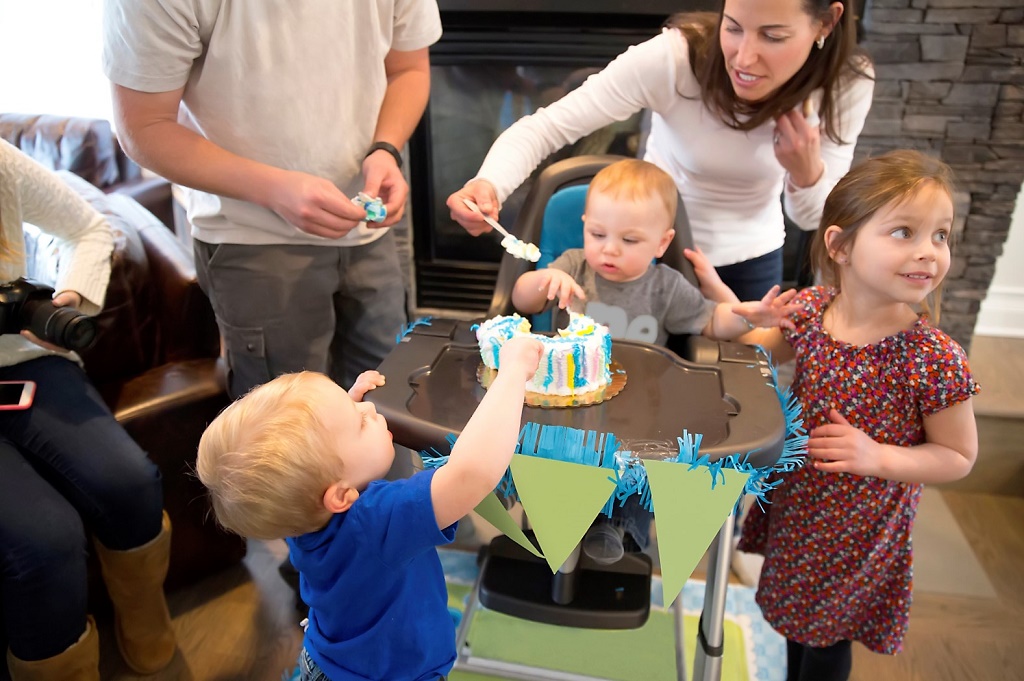From the Catechism of the Catholic Church:
2685 The Christian family is the first place of education in prayer. Based on the sacrament of marriage, the family is the “domestic church” where God’s children learn to pray “as the Church” and to persevere in prayer. For young children in particular, daily family prayer is the first witness of the Church’s living memory as awakened patiently by the Holy Spirit.
Our families are meant to be “little churches:” places where we practice our faith earnestly, we pray together, we make meals a priority, we forgive and celebrate together.
Is it just me, or are some of us saying, “Yeah, right…”?
We know the reality of family life: tussles to get everyone out the door in the morning. A shouting match with a teenager. Deep hurts with siblings that go back decades. Exhaustion from sleepless nights due to a baby’s needs or a toddler’s nightmares. Is this a “little church?”
Yes, it is. With all its troubles, heartaches, mistakes and mishaps, our family is our little church, our domestic church. It helps to remember that – as Blessed Teresa of Calcutta was fond of saying – God does not call us to be successful: He calls us to be faithful. We are not called to be perfect parents or perfect kids, perfect siblings or spouses. We are called to try to live out our faith in the mundane parts of our life (Time to clean the bathrooms!), in the harsh reality of our life (We need to put Dad in a nursing home), in the daily conflicts and crises (Our teen is lying to us; what do we do?)
It helps to think about the Holy Family. Maybe that seems a bit, well, ridiculous: after all, Jesus is perfect, Mary had no original sin to deal with, and Joseph was a saint! How is my family supposed to be like that?
Hear me out. Even though the Holy Family was holy, that doesn’t mean they didn’t face challenges. Imagine the gossip when it was discovered that Mary was pregnant before she and Joseph wed. That was literally a sin punishable by death; Mary could have been stoned. Surely there was talk – and not all of it nice.
Joseph and Mary, newlyweds and new parents, had to flee to Egypt in order to save their Son. They had to leave their family and home. Imagine: having a new baby and not having your mother or aunt or sister to help. Imagine leaving your business behind as the father, and having to provide for your young family in a foreign country.
At some point, Joseph died. Mary lost her spouse, Jesus his foster father. It may have happened when they were a younger family, or when Jesus was an adult. Either way, we know this pain.
Some of us know what it’s like to watch a child go through something terrible: a horrible illness, an addiction, an unplanned pregnancy. Imagine Mary’s pain watching her Son be tortured and killed.
Yet through all of this, the Holy Family was holy. They were faithful. They kept their promise to God: to serve Him, to love Him, to share His promise with others. When we were baptized, we made this same promise (or our parents made it for us.) We make it every time we pray the Creed: “I believe!” We make that promise when we faithfully attend Mass.
We also get the grace necessary to keep this promise. God doesn’t give us the task of being a domestic church, and not give us any help. No, we have grace: God’s very life in us. We can’t be holy on our own; we need God’s grace. But once we have that gift of grace, and we use it, we run with it: we can be holy! We can transform our lives, our families, our homes. That doesn’t mean we will be perfect, or even successful, but we will be faithful.
Make an opportunity to talk, as a family, about being a domestic church. What can you do better? What are you doing well? Where do you see God’s grace in your home? And then pray together for your domestic church.
 As Diocesan Publications’ Solutions Evangelist, Tommy is committed to showing parish and diocesan staffs how to use our communication tools to their best advantage. He has worked for years in various, youth ministry, adult ministry, and diocesan roles. As an expert on Catholic communication, Tommy uses his parish and diocesan experiences to help you make your ministry effective. To bring Tommy to your parish or for general inquiry, contact him at tshultz@diocesan.com.
As Diocesan Publications’ Solutions Evangelist, Tommy is committed to showing parish and diocesan staffs how to use our communication tools to their best advantage. He has worked for years in various, youth ministry, adult ministry, and diocesan roles. As an expert on Catholic communication, Tommy uses his parish and diocesan experiences to help you make your ministry effective. To bring Tommy to your parish or for general inquiry, contact him at tshultz@diocesan.com.

 Elise Hilton is an author, blogger, and speaker. She has worked in parish faith formation and Catholic education for over 25 years. A passionate student of theology, Elise enjoys sharing her thoughts on parish communication, the role of social media in the Church, Franciscan spirituality and Catholic parenting. To inquire about booking her as a speaker, please contact her at
Elise Hilton is an author, blogger, and speaker. She has worked in parish faith formation and Catholic education for over 25 years. A passionate student of theology, Elise enjoys sharing her thoughts on parish communication, the role of social media in the Church, Franciscan spirituality and Catholic parenting. To inquire about booking her as a speaker, please contact her at 







